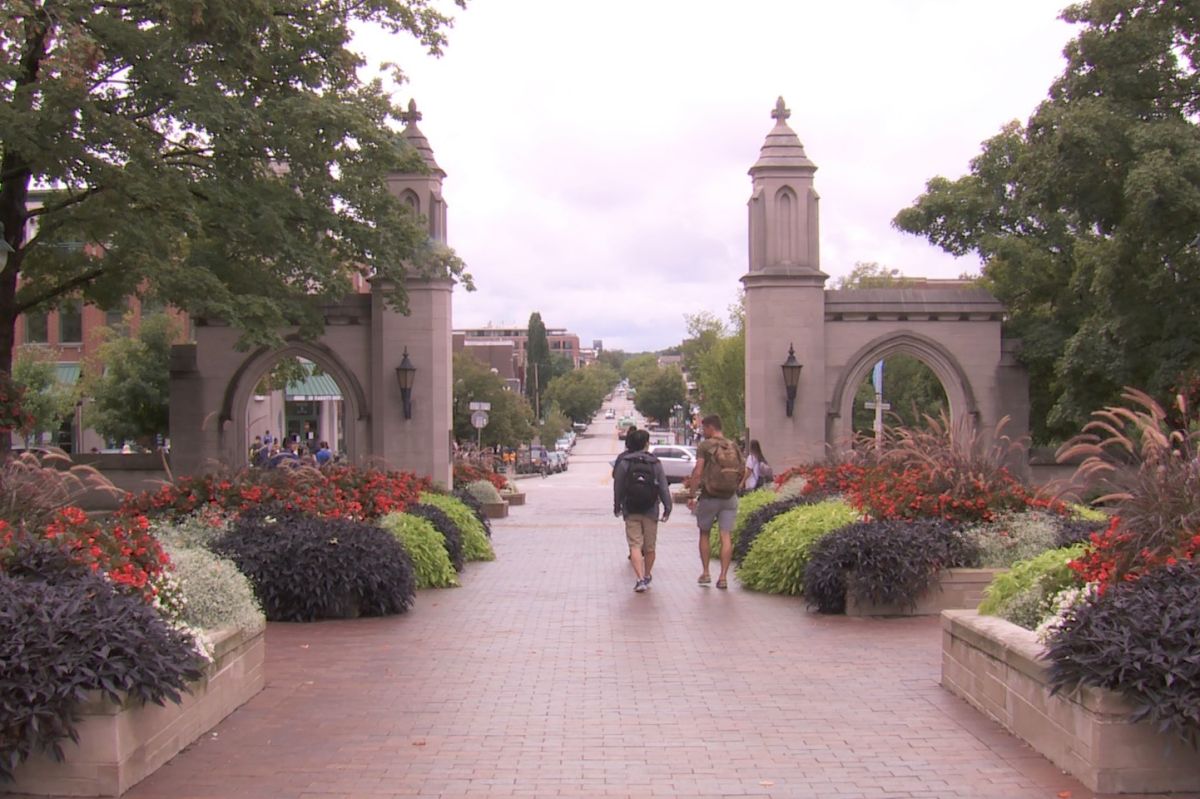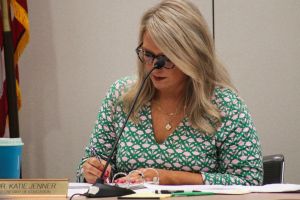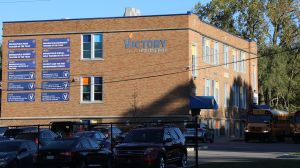
(Seth Tackett, WTIU/WFIU News)
In 2015, then-IU President Michael McRobbie announced an ambitious $300 million research initiative known as the Grand Challenges. Faculty from across IU’s campuses submitted applications for interdisciplinary programs to address some of the world’s most pressing issues and make an impact on the lives of people across Indiana.
Eventually, three Grand Challenges were selected: the Precision Health Initiative, Prepared for Environmental Change, and Responding to the Addictions Crisis.
The initial $300 million in funding was parceled out to each program over the course of five years. With Precision Health passing the five-year mark in 2021 and the other two programs reaching that milestone in 2022, researchers and administrators are reflecting on the work that’s been done and offering their thoughts about the future.
The five-year mark
In an interview with WFIU last month, President Pamela Whitten made clear she thinks the Grand Challenges initiative has run its course.
“There was kind of a trend across the US in the last decade to have grand challenges,” Whitten said. “Lots of schools did them, and they had big ones and different kinds of output and success from them. That’s kind of yesterday’s trend.”
In the interview, Whitten said she wants to pursue a more “organic” approach to research at the individual faculty level.
Vice President for Research Fred Cate offered an elaboration on Whitten’s response.
“I don’t think it’s inaccurate, I think it’s probably incomplete,” Cate said. “My guess is if she had more time, she would’ve said, ‘they were a trend, they did a lot of good things, they served their usefulness, and now it’s time we move onto something else.’”
A law professor at the Maurer School, Cate was tapped as Vice President for Research in 2015, in part to help launch the Grand Challenges. In that role, he helps administer the challenges, such as by providing outside evaluation and resources.
Cate said at this point his administrative duties also include working with the teams on an “orderly wind-down” as the challenges reach the end of five years. He reiterated that the five-year vision was integral to how the challenges were first pitched and conceptualized.
“The president’s been a huge advocate for research – not just someone who talks about it, but someone who’s actually committed new resources and new attention to it,” Cate said. “I think she felt – I think we all felt – that the Grand Challenges had a scheduled lifespan, and that it’s important we stick to that lifespan, because it’s a tendency once you start funding something to just keep funding it forever. That would be fine, except then it means that you won’t have money to fund new things. It means you’re focusing on yesterday’s idea rather than tomorrow’s idea.”
Still, directors of the three challenges see their work as far from over. As they transition from relying primarily on university funding to financial self-sufficiency, each expressed long-term aspirations and a need for continuing research.
Precision Health Initiative
The first Grand Challenge announced, the Precision Health Initiative aimed to cure or prevent five major diseases: Alzheimer’s, multiple myeloma, pediatric sarcoma, triple negative breast cancer, and type 2 diabetes.
To do so, researchers developed methods to research and treat diseases based on a number of factors unique to each patient, including genetics, lifestyle and environment. By better understanding the underlying causes of these diseases, researchers such as Tatiana Foroud hoped to prevent them.
“The long-term goal was to develop infrastructure that would allow us to transform and bring precision healthcare into our system, with the ultimate goal of improving health for Hoosiers,” said Foroud, principal investigator of the initiative.
A statistical geneticist in the School of Medicine, Foroud led Precision Health’s genomic medicine research before replacing Anantha Shekhar as the leader of the program. She shared her vision for the project’s longevity.
“The Precision Health Initiative was meant to be a long-term transformative initiative. It’s very deliberately designed to build infrastructure,” Foroud said. “What we did from the very beginning was consider, ‘how do we have sustainability?”
Thanks in part to investments by IU Health and grants from public and private partners, the Precision Health Initiative has created infrastructure that Foroud believes will last. The Good Manufacturing Practice Facility will enable scientists at IU to develop new genetic and cell therapy trials, and the School of Public Health says it has developed the most powerful genome sequencing capabilities in the Midwest. The Precision Health Grand Challenge also launched the Undiagnosed Rare Disease Clinic, where it puts its sequencing capabilities to use identifying genetic conditions among individuals struggling to find a diagnosis.
Foroud said these facilities are essential to the future of the School of Medicine.
“We need them. We don’t just need them for five years,” she said. “All of these core resources have to continue for us to do state-of-the-art research.”
Foroud said not all funding for that work can come from grants, and sustained investment by the university will be necessary for it to continue.
“We must continue to invest in what we built,” Foroud said. “There will continue to be an investment, but the investment of $120 million was essentially a down payment, and we’ll continue to pay interest to make sure everything remains current, remains state of the art and remains affordable.”
Prepared for Environmental Change
Faculty and full-time staff from across science and humanities disciplines work with Prepared for Environmental Change to ready Indiana for the impact of a heating planet.
The challenge intends to improve the science, understanding and modeling of impacts of climate change and better communicate that information to Hoosiers.
IUPUI professor Gabriel Filippeli heads up the initiative. He said the program helped move IU to the forefront of climate research.
“On the research front, we’ve actually advanced IU’s understanding and influence on science in the Midwest region,” Filippeli said. “We’re one of five institutes that is identified by the United States Geological Survey as a hub for understanding how climate change will impact wildlife.”
Still, he sees research as only half of the equation.
“You can do all the research you want at a university, but if you can’t communicate that information to the public, it has limited local and regional impact,” he said.
To do so, researchers created the Environmental Resilience Institute, which is meant to bridge the gap between work at IU and communities around the state. The institute works with local governments, businesses and nonprofits to develop solutions for climate-related challenges.
A major component of that outreach is the McKinney Climate Fellows program, which embeds students in communities around Indiana to help them become more environmentally resilient. The institute received a five-year grant from the McKinney family several months ago that Filippeli said will help extend the project for another five years.
Filippeli said university administrators have been supportive partners of the program. He and another member of the initiative were invited to join the president’s Climate Action Committee last spring. “I think it’s a statement of the commitment the university has in the climate and in incorporating the very best science into assessing how the university responds to climate change,” Filippeli said.
He sees opportunity in the institute's transition from a program mostly dependent on university money to one that is largely self-funded. “We hope for continued support from the university, but also understand that we are increasingly needing to pull our own weight which allows us to branch off into some really interesting directions,” Filippeli said. “We’re a little more self-directed, which is phenomenal as well.”
Responding to the Addictions Crisis
Addiction and prescription drug abuse are major problems in Indiana, and they’ve only gotten worse during the pandemic. The third Grand Challenge, Responding to the Addictions Crisis, began in the heat of the crisis and works with the state to improve policies and infrastructure around addiction services.
School of Nursing dean Robin Newhouse, lead investigator for the challenge, said she was invited by then-President McRobbie to pull together a group of faculty and develop a proposal for the addiction’s crisis.
“We really built [the program] around what we knew around IU investigators and what we knew around IU strengths here on campus,” Newhouse said. “The areas that we were going to fund were identified by those strengths that our investigators have right here already that then could be deployed to this public health emergency.”
In order to better employ those existing strengths, Newhouse gathered researchers from multiple colleges in medicine, public health, informatics, education, and law. The leadership team saw one of its primary goals as training a statewide workforce to combat addiction. That work included adding new courses and programs on IU campuses and training community health workers in mental health counseling.
Newhouse said her team also worked closely with Indiana government officials and organizations, consulting on policy decisions guided by their research. Still, the scope of the program is so wide and the extent of the crisis so broad that she sees their work as a lasting part of Indiana’s public health infrastructure.
“Frankly, 17 projects are done now with the balance to be completed by 25. So we're not done yet, but I think good work has been done and we're very proud,” Newhouse said. “We have worked with over 100 partner organizations. And those relationships have been sustained, which gives us the opportunity to quickly work together in any other kind of public health deployment.”











